Volume 34, Number 9
Seasonal changes? Precautions are urged
Leaves turning color, cooler days and nights, and the return to school are among the signs of fall. Another sign health officials are watching for is whether Minnesotans will see another autumn surge in cases of COVID. Surges in illness have been seen in the fall for the past few years. Health officials say that’s a good reason to get a booster vaccine at this time of year.
Keeping vaccines up-to-date and testing for COVID symptoms is still urged. 2023 will be the first fall and winter seasons without a federal public health emergency in place. That will mean being vigilant about COVID, as well as flu and RSV.
Respiratory syncytial virus or RSV causes infections of the lungs and respiratory tract. It's so common that most children have been infected with the virus by age 2, according to the Mayo Clinic.
In adults and older, healthy children, symptoms are mild and typically mimic the common cold. Self-care measures are usually all that's needed to relieve any discomfort. But it can cause severe infection in some people, including babies 12 months and younger (infants), especially premature infants, older adults, people with heart and lung disease, or anyone with a weak immune system (immunocompromised). People with disabilities need to be aware of RSV. So, what to do with three diseases to think about? Many people routinely get flu shots every fall. RSV vaccines are also becoming available. And of course, many people with disabilities are advised to keep up on COVID booster shots. Health care providers and local health departments can provide information.
The risks of COVID are not over and everyone is advised to continue to take precautions. Just as a surge in cases was seen after this year’s July 4th holiday, surges could also be seen after the Minnesota State Fair. Fair attendance was strong as this issue of Access Press went to press, and fewer people were seen taking precautions.
Minnesota hospitalizations after July 4th increased from 41 on July 3 to 93 after the holiday. Increases in viral material were also found in wastewater samples.
What health officials are watching closely is the new EG.5 coronavirus variant, which became the dominant source of COVID this summer. EG.5 was found in May in Minnesota. Those wanting a booster shot should watch for a new vaccine booster that specifically targets that variant and other shifts in the dominant coronavirus strain.
Around the nation, health officials have emphasized that while COVID hospital admissions have inched upward in the United States since early July, it is in a small-scale version of the past three summers. And the surges are not nearly as great as those in the past. Still, it is a reason to be vigilant and take precautions.
Judge Donovan Frank is honored with 2023 Access Press award
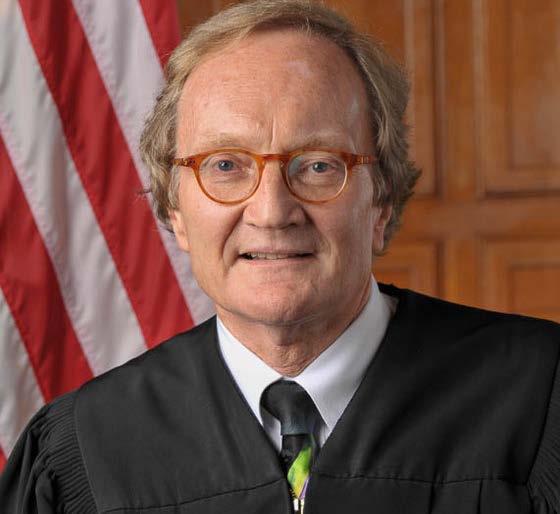
by Access Press staff United States Federal District Court Judge Donovan W. Frank is the winner of the 2023 Access Press Charlie Smith Award for 2023. The award will be presented at a celebration Friday, November 3 at McNamara Center at the University of Minnesota’s East Bank campus. Tickets for the event are now available.
The award is given to Minnesotans who provide outstanding service to people with disabilities. Nominations come from community members. The winner is chosen by the Access Press Board of Directors. Board members agreed that they had a strong field of nominees to choose from,
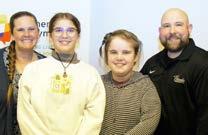


but that Frank is uniquely qualified. He has presided over some of Minnesota’s most important cases that involve people with disabilities and their rights.
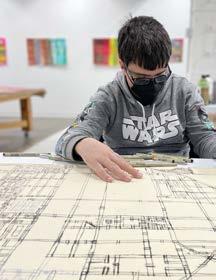
“Judge Frank’s work has been crucial in matters that affect the daily lives of Minnesotans,” his nomination stated. “He has been fair and thoughtful, and has been able to advance critical needs through his work. He sees the needs of the community and his rulings back that up. Recognition is long overdue for rulings that protect people with disabilities.”
Frank has been involved in several high-profile cases involving people with
Meet our award nominees Page 3
Deaf printers sought Page 5
Lopez is remembered Page 7
Campus is sold Page 8
Made in the Shade Page 11
Partners graduates speak out Page 6
Voters with disabilities need to know their rights
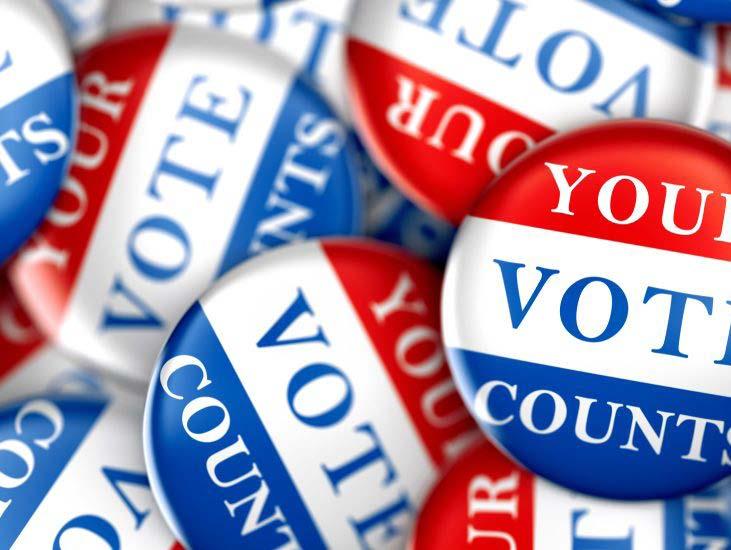
Susan lives with a traumatic brain injury. She makes her home with her sister, who is also her legal guardian. Susan follows public affairs and is interested in voting for her next state senator. She and her sister don’t agree on politics. Can Susan’s sister prevent her from voting?
Craig lives with developmental disabilities. He resides in a group home, holds a job at a grocery store, and take part in community activities. He has met some city council candidates and wants to vote for one of them in the next election. He has a conservator who oversees his financial affairs. Should Craig vote?
The answer to both questions is yes. Persons under guardianship and conservatorship in Minnesota can vote. This is often misunderstood, by people in those roles, family members of people with disabilities and even election officials.
Ramsey County provides useful information outlining guardianship and conservatorship issues. Guardianships or conservatorships are designed for those


Access Press Celebration & Fundraiser Nov. 3! Be there! www.accesspress.org
NONPROFIT ORG. U.S. POSTAGE PAID TWIN CITIES, MN PERMIT NO. 4766
JUDGE FRANK To page 4
WWW.ACCESSPRESS.ORG September 2023
NEWS DIGEST
COVID To page 5
Judge Donovan Frank
RIGHTS To page 5
SUBMITTED PHOTO
Protect disabled voters from those who would block their vote
Voting is a fundamental right for us as Minnesotans and as U.S. citizens. Many of us remember the first time we cast a ballot. We were proud to vote for the candidates of our choice.
We at Access Press often emphasize the ease of early voting in Minnesota. We are thankful that is an option and we don’t take it for granted. We also respect that many people like to go to a polling place and cast a ballot.
Those of us with disabilities have not always had that rite of passage experience when we cast our first ballot, or as we continue to practice our rights as voters. We may have sat in a wheelchair or on a scooter, and pondered the staircase in front of us. We may have had no assistance with a visual disability. We may have encountered a less-than-stellar election judge who tried to improperly influence our choices instead of simply assisting us with marking a ballot.
Annoying and frustrating as those experiences can be, we especially take issue with people who try to prevent people with disabilities from voting. It is an incredible form of disrespect, to deny someone a basic civil right. It’s just wrong.
Our voting rights have been protected for many years, going back to the Voting Rights Act of 1965. It requires election officials to allow a disabled voter to receive assistance from a person of the voter’s choice. It prohibits tying the right to vote to a citizen’s ability to read, write, attain a certain level of education, or pass a test.
The Voting Accessibility for the Elderly and Handicapped Act of 1984 puts further access
requirements in place for us.
The Americans with Disabilities Act (ADA) is a leading mandate to widely protect against discrimination, including when someone is voting. The U.S. Department of Justice offers guidance on how to apply the ADA on voting issues at www.ADA.gov, with a comprehensive checklist for accessible polling places and information on common problems.
We also rely on the Help America Vote Act (HAVA) of 2002, which spells out how voting must be accessible for individuals with disabilities, especially for people with visual disabilities. It also requires that each polling place have at least one accessible voting device in place for federal elections. But we’d like to see done more in cases where a disabled person’s competency is
questioned. We’d like to see better, stronger protections, and more sanctions against those who would unfairly prevent others from voting.
We all too often read of family members who try to prevent a disabled person from voting. Or, election judges may unfairly question someone’s competency and try to keep someone from voting. These people need to face some consequences.
So let’s all remember this:
As long as a judge did not restrict a person’s right to vote through court order, disabled voters have the right to vote even when under guardianship or under conservatorship. That also applies if a voter has a brain injury, has a cognitive disability, experiences memory loss or has given someone else the power of attorney.
Minnesota’s services for the blind mark century of progress HISTORY NOTE
Break out the birthday party hats! State Services for the Blind (SSB) is marking 100 years of service to Minnesotans in 2023.
Long before the SSB predecessor Minnesota Board of Control was created on July 1, 1923, Minnesotans recognized the importance of education, independence and employment of people who are blind or live with visual disabilities. The Minnesota State Academy for the Blind, which was started in 1866, began a first of its kind education program in 1907. An academy graduate earned his PhD. from Yale University. It is believed to be the first degree of this kind to have been earned in residence and received in this country by a blind man.
On May 27, 1920, a group organized to improve the quality of life for all blind Minnesotans, called the Minnesota State Organization of the Blind. That group today is the National Federation of the Blind of Minnesota. It is one of many advocacy groups today, working on issues including social justice, accessibility, literacy, employment discrimination, and service access.
Employment efforts came later. It wasn’t
until 1941 that Minnesota appropriated $2,500 for vending stands to be run by blind entrepreneurs. And on May 1, 1947, Business Enterprise Program vendors were provided rent free space throughout all state buildings to vend soft drinks (excluding 3.2 beer), food, candies, tobacco, souvenirs, notions and related merchandise.
In 1953, the Hamm Recording Project was responsible for making textbooks, Minnesota magazines and Minnesota authors available in an audio format for people who were blind and visually impaired. By 1969 the Hamm Recording Project, now the Communication Center, was also providing Braille for Minnesotans, and had expanded their volunteer base considerably. On January 2, 1969, thanks to the brilliant minds of C. Stanley Potter and his coworkers, the Minnesota Radio Talking Book Network went on air. It was the world's first radio reading service for the blind.
Today’s Braille Unit is an active partner with the Minnesota Department of Education, brailling K-12 textbooks. This team is even working on developing a
Braille code for the Dakota language. The Audio Services Unit produced the first accessible audio books in Hmong, Karen, Somali, and Anishinaabe. Radio Talking Book, once listened to on radio receivers in Minnesota, is now streaming across the world on mobile devices and smart speakers.
Passage of the 1973 Rehabilitation Act was hailed as the foundation of civil rights legislation for people with disabilities. But years of activism and protest were needed so that the provisions in that landmark legislation were carried out. Significant amendments passed in 1978 finally began to address the needs of a whole category of people who had never before received federally funded support, namely, seniors living with vision loss. Today the SSB senior unit is second only to California in number of people served. That is just one of many accomplishments over a century.
The History Note is a monthly column produced in cooperation with the Minnesota Governor’s Council on Developmental Disabilities. Past History Notes and other disability history may be found at www. mnddc.org
No one else can make a decision on voting on a voter’s behalf, including a spouse, children, attorneys, caregivers, doctors or nurses.
The only disabled Minnesotans who cannot vote are those who have been declared legally incompetent by a court. Residents of a group home or other residential facility for people with disabilities can vote, typically if they bring a staff member to the polls to vouch for them. Residential facilities can include assisted living facilities, facilities for victims of domestic violence, homeless shelters, nursing homes, residential alcohol and chemical treatment facilities, supervised living facilities, transitional housing and veterans’ homes. This can be a long process for election judges as voters are verified and assigned in. But it is a process that nevertheless must be followed and must comply with the law.
People who try to block our voting rights as disabled citizens need to be called out. Disability law advocates need to know when our voting rights are threatened, even if family members are involved Local election officials need to know if an elections worker tries to prevent someone from voting. The news media needs to know.
We people with disabilities need to vote, freely and unencumbered.
On May 27, 1920, a group organized to improve the quality of life for all blind Minnesotans, called the Minnesota State Organization of the Blind. That group today is the National Federation of the Blind of Minnesota.
EDITORIAL: Editorial submissions and news releases on topics of interest to persons with disabilities, or persons serving those with disabilities, are welcomed. We reserve the right to edit all submissions. Editorial material and advertising do not necessarily reflect the view of the editor/publisher of Access Press.
DEADLINE: 15th of each month.
CIRCULATION/DISTRIBUTION: Distributed the 1st of each month through more than 200 locations statewide. Approximately 750 copies are mailed to individuals, including political, business, institutional and civic leaders.
SUBSCRIPTION: Free and accessible to anyone in MInnesota, visit www.accesspress.org to subscribe.
ABOUT ACCESS PRESS: A monthly newspaper published for persons with disabilities by Access Press, Ltd.

POSTMASTER: Send address changes to Access Press, PO Box 40006, Industrial Station, St. Paul, MN 55104-8006

INQUIRIES AND ADDRESS CHANGES should be directed to: Access Press, PO Box 40006, Industrial Station, St. Paul, MN 55104-8006; 651-644-2133; email: access@accesspress.org

September 2023 Volume 34, Number 9 Pg 2
............................................................................................................................................................................................ Jane McClure Board of Directors Tim
Benjamin,
Clark, Adrienne Coatley,
Brendan Downes, ............................................................................................................... Catherine Hunter,
Larson,
Roscoe,
Willshire
Business Operations and Advertising Manager Mary Graba Production ....................................................................................................................................................................................... In-Fin Tuan Digital Production Tricia Donovan Website: accesspress.org email: access@accesspress.org phone: 651-644-2133 Co-Founder/Publisher Wm. A. Smith, Jr. (1990-96) Co-Founder/Publisher/ Editor-in-Chief Charles F. Smith (1990-2001) Editor-in-Chief/Executive Director Tim Benjamin (2001-2020)
Website: accesspress.org Editor
S.
John
Mark Daly,
Jane
Ann
Kay
(Chair)
EDITORIAL
conservatorship.
As long as a judge did not restrict a person's right to vote through court order, disabled voters have the right to vote even when under guardianship or under
DESERVING NOMINEES
Meet the other 2023 nominees for the Access Press Charlie Smith Award
The return of the annual Charlie Smith Award gives Access Press the chance to spotlight outstanding Minnesota people, events and volunteer organizations. Thanks to all who submitted nominations.
The newspaper board of directors had a challenging time picking a winner, as all nominees were very worthy. Here are the stories of our other 2023 nominees:
Access North Center for Independent Living’s Accessible Deer Hunt
The Access North Center for Independent Living’s Accessible Deer Hunt is nominated for the work dedicated volunteers do to provide an outdoor experience for people with disabilities.
As a center for independent living (CIL), Access North is dedicated to supporting people to achieve independent lives in the community.
The accessible deer hunt has always been more about spending time with enjoying nature, and time with family and friends, than it is about harvesting a deer. Multiple generations gather at deer camps each fall.
When a person becomes disabled, it’s all too easy to be excluded from these lifelong traditions. Disability can take away the ability to enjoy the outdoors and can be emotionally devastating.
The accessible deer hunt restores this tradition for people with disabilities by providing all necessary support to embrace the outdoors and the connection to family, friends and the thrill of the hunt.

Access North has partnered with the Minnesota Department of Natural Resources and McCarthy Beach State Park for past four years to plan and implement an accessible deer hunt within the park. The deer hunt provides activity for 10 disabled hunters each fall.
Park rangers scout out hunting blind locations with CIL staff. Access North provides full support for hunters including specialized transportation if needed, motel stay, food and beverages, hunting blind access, heaters, hunt tripods, transportation into and out of the field, support while in the hunting blind, and support to track, field and process a deer.
Everything a hunter needs is provided for an enjoyable hunt. Hunters greatly appreciate the experience.
Access North coordinates with local emergency management services to provide GPS coordinates for hunting parties. Everyone can have a safe event.
At least three hunters enjoyed one more outing before they died. Families have shared that this was a very meaningful experience for everyone.
Annually about half of the hunters are military veterans. One said that being able to enjoy hunting again gave him a sense of community he hadn’t enjoyed since returning to civilian life.
One military veteran became homeless after discharge and was alienated from his son. His transition back to civilian life was a journey of despair and hopelessness that ended with accomplishment and pride. He and his son enjoyed hunting and special time together.
Deer hunting is a big part of northeastern Minnesota culture. The Access North program is the first of its kind in the region. It relies on area businesses and the Hibbing and Sturgeon Lake Minnesota Deer Hunters Association chapters. About 40 volunteers support each hunt.
The state park in collaboration with Access North has also added an accessible beach mat for easier entrance into water, a flotation water bike and an action track chair for trail users. All are available for use at no cost.
Disability Hub MN
Disability Hub is nominated for its ongoing efforts to be a comprehensive resources and guide for Minnesotans with disabilities, and its work in helping tens of thousands of Minnesotans since 2005.
The Disability Linkage Line/Disability Hub is a Minnesota-specific service providing information directly to people with disabilities, family members, caregivers and allies about their problems or issues, either through in person phone calls or online.
Counselors are trained specifically on the


various topics important to Minnesotans with disabilities. the counselors also undergo continuous training to help consumers in areas of concern. The most common issues asked about are health benefits, cash benefits, house/shelter and health and wellness. In 2021, there were 67,937 contacts with the Disability Hub, serving 23,841 people. The average wait time was one minute, eight seconds.
Consumers report high satisfaction with the help received. The service has a thorough list of Minnesota service providers to make referrals to.
In 2017, the Minnesota Department of Human Services updated the Disability Linkage Line and relaunched it as Disability Hub MN in recognition of an evolution in its services. Since 2005, Disability Linkage Line has focused on providing information and assistance. Today, options counselors not only help people find information, they are also trained to make it easier for people with disabilities to review and understand the scope of their benefits, understand their health insurance options, create a plan to enter the workforce or maintain employment, make sure they are getting the most out of employment and benefits, and strategize ways to live more independently.
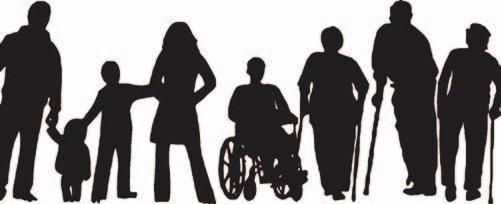
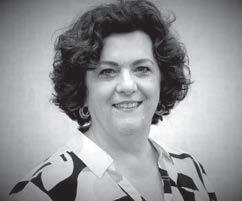
The Metropolitan and Southeastern Minnesota Centers for Independent Living provide Disability Hub services for people throughout Minnesota. Disability Hub operates as part of the MinnesotaHelp Network, which includes Senior LinkAge Line (800-333-2433), Veterans Linkage Line (888-LinkVet) and the online resource database MinnesotaHelp.info.
At Disability Hub MN, there is no such thing as a wrong question. Whether people are facing an immediate concern or planning for the future, Hub staff are available to help. A single toll-free number, 1-866-333-2466, connects callers with an options counselor who will help the person understand options, manage benefits, overcome service barriers and plan for the future.
People who are helped learn how to live more independently and use services they may not have been aware of. They are also assisted in working through frustrating
bureaucratic process often necessary to get services. People helped to live more independently and be less frustrated, allowing them to be more active in their own lives and in their communities.
Without this service, there would be greater frustration than there already is about disability services and supports Many people would not have received information or services, reducing their
ability to live independently and to be of benefit to their communities.
Interact Center for the Visual and Performing Arts
Interact Center for the Visual and Performing Arts is nominated for its service to provide an array of arts experiences to clients, and for its commitment to its “home” neighborhood and the region.
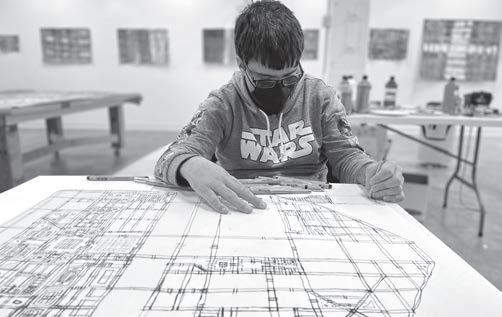
Interact is a theater and visual arts center, based in the Hamline Midway neighborhood of St Paul. Interact encourages and welcomes individuals with disabilities to join, create, exhibit and perform works of art across multiple media to express themselves as they wish to do so. It is a unique and valuable organization in its neighborhood and the greater region that contributes back to the community as well in many ways.
Interact’s mission is “to create art that challenges perceptions of disability has opened doors for artists with disabilities and audiences eager to experience their work. Artists might never have seen the arts as a life choice, but now see the arts as essential to their humanity. With more than 100 artists working in theater and studio arts, Interact is multi-cultural, intergenerational, and embraces the entire spectrum of disability labels.”
Interact exists in a very interesting space. It is not a “day program,” but neither is it an employment placement agency. It exists as an affordance for people with disabilities who wish to express themselves in creative ways to explore their creative energies and provides them with resources and outlets to do so. It is a full-blown art gallery and theater company that puts on exhibits and performances featuring their members, just like any other gallery or theater company may do, with the slight exception that the artists that they represent are primarily people with disabilities. The core strength of
September 2023 Volume 34, Number 9 Pg 3
Access North Center for Independent Living's
Accessible Deer Hunt
NOMINEES To page 9
Shelly Madore
Be part of a great resource! Join the Access Press Directory today. Our next print edition is October 2023 In print four times annually and online 24/7, the Access Press Directory offers quick access to an array of services and supports Minnesotans with disabilities. From housing to health care, recreation to recovery, clubs to consumer-directed community support, we offer the information you need for your best life! Have a business, service provider or organization needing visibility at a low cost? Contact us today! accesspress.org/add-listing/directory 651-644-2133 access@accesspress.org Are you a current Directory member? To renew your listing, make updates and add new categories, visit accesspress.org/renew Just $70* per year gets your listing in front of readers eager for services and support. *Add additional listings for a small fee. Thanks to our advertisers for their ongoing commitment to Access Press!
Interact Center for the Visual and Performing Arts
SUBMITTED PHOTOS
FROM OUR COMMUNITY
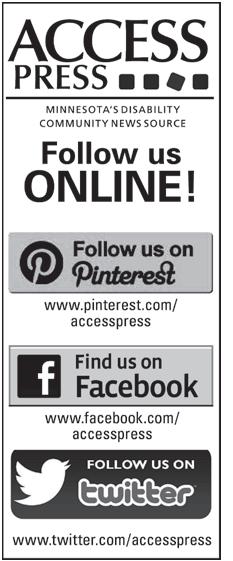
Independent living requires many steps to address our care crisis
Editor’s note: Minnesota recently sent 27 people from four Minnesota centers for independent living and the Disability Law Center at the National Centers for Independent Living conference in Washington, D.C. That was the largest delegation from any state represented at the conference.
The Minnesota Statewide Independent Living Council (MNSILC) shared position papers with Minnesota’s Congressional delegation. Topics are transportation, broadband and the workforce shortage. Excerpts from the paper on the workforce shortage are printed below.
Direct care workers are vital to our economy and community as they reduce abuse, injuries, costly hospitalization and institutionalization of people with all types of disabilities, be they direct support professionals, personal care assistants or "home health aides."
Hiring care workers has become more challenging due to limited career opportunities for stable living and advancement opportunities in the care industry. Direct support workers have either lived at or below poverty margins due to limited wages and benefits that provide a respectable quality of life. Nationally, 40 percent of direct care workers live near the poverty line and 43 percent of direct care workers rely on public benefits to get by. Most states pay an average of $14.27 hour with limited benefits when a minimum necessary wage is approximately $22-$25 an hour, not including a decent benefit package to ensure health care coverage, paid time off, sick time, and retirement.
Turnover rates nationally are between 40-60 percent for direct care workers. Many
JUDGE FRANK
From page 1
disabilities. One is the case involving Minnesota Extended Treatment Options, a state-run facility in Cambridge. Staff there was accused of harshly punishing clients with disabilities, even break one person’s arm. Use of seclusion and restraint was at the heart of the challenge families made.
Work to jump-start Minnesota’s Olmstead Plan came out of that 2011 settlement. Since then Frank has been someone Minnesotans have counted on, to make sure that the plan was properly developed and put into place.
At one point he called for more work on the plan, saying it was too vague and lacked "concrete, reliable and realistic commitments" on firm timelines and deadlines for implementation.
Olmstead refers to a 1999 U.S. Supreme Court ruling, Olmstead v. L.C., that made it unlawful to keep people with disabilities in institutions when they could live in the community.

Frank has presided over other cases involving Minnesotans with disabilities, including a recent case tied to Olmstead and the plaintiffs’ rights to live in the communities they choose. That case was Murphy vs. Harpstead, and was settled recently.
Frank is a senior U.S. District Judge for the U.S. District Court, District of Minnesota. Born in Rochester, he is a graduate of Luther College in Decorah, Iowa and the Hamline University College of Law in St. Paul. He began his legal career as an assistant county attorney in St. Louis County, Minnesota. In 1985, he was appointed a state district court judge in Minnesota’s Sixth
factors are contributing to significantly high turnover rates including limited supervision, lack of professional development or career growth opportunities, low wages, lack of benefits, and rising inflation/cost of living over the past two decades. Care staff cannot provide quality care when they themselves are underemployed.
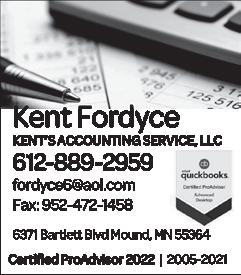
COVID-19 catalyzed a significant exit of the direct care workforce which compounded the previous crisis. Staff are burdened with overtime, at higher risk for infection, and received minimal wages and benefits to support when exposure led illness or injury. COVID-19 also created additional trauma as patients in congregate care settings at significant risk for infection and died at higher rates than those living in their own homes. In Minnesota, nearly 80 percent of all COVID-19 deaths occurred in residential facilities. With and without the pandemic as a factor, providing cares to persons with disability is often a physically and emotionally demanding job as it requires heavy lifting, long periods of standing, and witnessing trauma which is often associated with discrimination.
Forecasted need continues to indicate that with an aging population, the recent

Judicial District. Frank served as an assistant chief judge of that court from 1988 to 1991. He was chief judge from 1991 to 1996.
On May 21, 1998, President Bill Clinton nominated Frank to the seat on the U.S. District Court, District of Minnesota vacated by David S. Doty. He was confirmed on October 21, 1998 and received his commission on October 22, 1998. He assumed senior status on October 31, 2016.
His career includes years of experience practicing law in northern Minnesota, and as a judge in the state courts. He brings to the bench his life experiences, which have provided additional insights and understanding of the lives and needs of people with disabilities. He has also worked within the federal court system itself, to enlarge employment opportunities for people with developmental disabilities.
In interviews, Frank has spoken of life experiences that shaped his views on disability. One was from childhood.
“From the time I was a little boy and really old enough to understand, at least so I thought, my Dad insisted on taking one of his older cousins, Dutch, who was developmentally disabled, to church with us on Sundays. He also insisted that Dutch should help us around my Dad's little TV and appliance store in southeastern Minnesota. Dutch lived on a farm outside of my
pandemic and other factors, the United States is looking at an increased service need that more than doubles the current need (cite here). This trend combined with the continued decrease of staffing ratios available is alarming. Without a stable direct care workforce, we are already seeing how this gap places pressure on the health care sector, unemployment and underemployment rates, and an increase of civil rights violations.
Impacts of the direct workforce shortage include increased rates of hospitalization and nursing home placement: increased cases of neglect and all forms of abuse in group homes and nursing facilities; extended and unnecessary hospitalization; and an increase of people with disabilities unable to living in a setting of their own choice. The latter is a violation of the Olmstead plan.
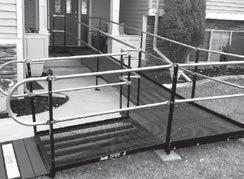
Other issues include increased abuse of public guardianship by health care and disability service providers to control placement of persons in most convenient settings; loss of home and employment for people with disabilities; workers living in poverty., and Home and Community-Based Waiver Services in jeopardy.
Direct care workers are the backbone of Home and Community Based Waiver Services
hometown,” Frank said.
“It was my parents, as I look back on it, who taught me not to perpetuate so many stereotypes of individuals with special needs or disabilities. However at the same time, it was important that we give them opportunities, and that's as my parents taught me, to realize their full potential and to live productive lives. I grew up watching my mother and father truly caring for people like Dutch in our community, with many acts of kindness and opportunities.”
He has also spoken of the rights of people with disabilities, the need for equal protection under the law, and how people with disabilities should be treated.
“I have observed firsthand that even a temporary loss of employment creates severe hardships, because many individuals with developmental disabilities not only completely rely on the income from these jobs, but more importantly to me, the dignity that is associated with being productive and needed members of society brings a quality of life to each of them, just like it does to each of us. . . ”
“Who can argue with me when I say that we are a better and stronger workforce that truly represents the community within which we live and work? And so when I am out and about, to put it one way, whether in my personal life or professional life, and I
which provides cost effective supports to people with disabilities, and in recent years, to our rapidly growing aging population. For the sustainability of our current system, increasing the strength of our middle class and overall economy, and ensuring equal rights for both the worker and the person with the disability, it is critical at this time to pursue action that will inform policy and reform the gaps in our current system.
Proposed solutions include increasing research and data responsibilities of states to report individuals in out-of-community placement or at-risk placement due to staffing shortages; and require Administration on Community Living to collect national data on guardianship to collect baseline information and track future trends of quantity, process by state, and potential violations by state.
We also must negotiate further policy flexibilities with Centers for Medicare and Medicaid (CMS) to support at-risk or institutionalized persons with additional funding or exceptions to support stabilization or return to community. Examples include additional self-directed service options, increasing rates based on time unable to pay staff, and increasing budgets for by region where staffing is more limited (such as rural locations).
Also, increase funding to the Administration on Community Living to supply aging and disability resource centers, areas on aging, centers for independent living and other non-profit organizations to provide informal, open-door supports. Another ask is to require the Department of Justice to report all complaints relating to direct care workforce shortages to Congress.
observe that individuals with developmental disabilities and other people with severe disabilities of all kinds are employed, be it part-time, full-time, I do my very best to seek out a manager, a department head and thank them for employing these individuals, and I promise them that I will not only be back to do business with them because I believe it a measure of being a good employer, a good neighbor, and a good business when they have a diverse workforce. I also tell them I'll spread the word that this is a good employer.
Frank has also spoken of the work people with developmental disabilities have done at the federal courthouse, saying that working in the same facility and sharing their experiences and struggles has taught him to be a better judge. How people are treated is very important. “Were they listened to? Were they treated with dignity and respect and patience?”
The November 3 event will be emceed by KARE-11 journalist Boyd Huppert. It will also include a tribute to the late Tim Benjmain, the longtime executive director of Access Press.
Tickets may be purchased at www. accesspress.org, for $75 per person or $600 per table of eight. Contact Jane Larson or Catherine Hunter at support@accesspress.org or at 612-562-7803 with questions, need more information, or wish to sponsor the event.
September 2023 Volume 34, Number 9 Pg 4
For your FREE estimate, call 800-649-5215 651-399-3075 Learn more at amramp.com Changing our customers’s lives, one ramp at a time. • Low cost • FREE home evaluations • Rent or buy • Installed in days
“It is important that our clients who struggle with stairs are able to maintain
their
freedom, dependence and community ties.”
Make the news! Receiving an award? Joining a board? Moving to new space? Winning a race? Filling a top post? Send us your “boast”! Marking a key date? Please don’t be late! Access Press welcomes submissions for the People and Places pages. Submissions are due by the 15th of each month. Questions? Call 651-644-2133 Staff are burdened with overtime, at higher risk for infection, and received minimal wages and benefits to support when exposure led illness or injury.
By Jane McClure
Not everyone in an old-time print shop could enjoy the clackety-clack of linotype machines, the rhythmic noise of presses and the rattle and hum of newspaper folders. That is because many people trained in the long-ago printing trades were deaf.
Several histories indicate that deaf people were seen as ideal candidates to operate linotype machines and other printing equipment. They would not be distracted by a noisy workplace.
Schools for the deaf and trade schools began offering training in linotype and press operations more than a century ago. When every community had its own newspaper and print shop, work was readily available for people who could operate linotype machines and all types of presses.
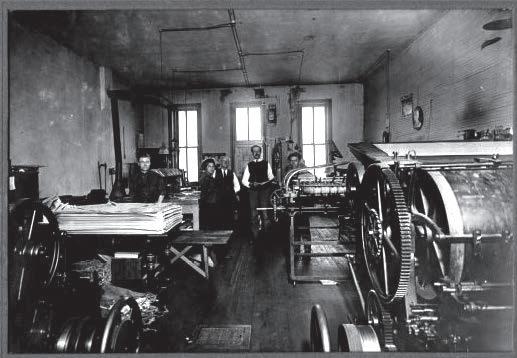
Two schools in Minnesota were among those that provided training for print industry workers who were deaf. What is now the Minnesota State Academy for the Deaf in Faribault offered training in its graphic arts program. Minneapolis’ Dunwoody Institute, now Dunwoody College of Technology, trained many people who worked in the region’s print industry. Both schools offered linotype training into the 1980s.
Janelle Legg is an assistant professor of history at Gallaudet University in Washington, D.C. Gallaudet is a leading
university for deaf people. Legg is curator of the website Deafprinters.com and project manager for the Schuchman Deaf Documentary Center at Gallaudet.
“Printing was an esteemed trade for most of the 19th and 20th centuries in the deaf community. A number of deaf people
a guardian, and the conservator and the guardian may be the same person.
supported themselves and their families in that occupation,” Legg said in a recent Journalism History podcast.
The Washington Post is well-known for employing many deaf people in its printing operations. A recent Post article noted that at one time the paper had more than 100
deaf linotype operators.
Deaf linotype operators and printers worked in Minnesota newspapers of all sizes for decades. Some spent their careers at newspapers. Others moved to other printing careers.
An example of a deaf Minnesota native who got his start as a linotype operator is the late Richard “Dick” Caswell. Caswell went to school in Faribault and then Gallaudet. He worked at the Washington Star newspaper for seven years as a linotype operator. Caswell then worked at the United States Printing Office before going to the U.S. Senate Committee on Armed Services as a proofreader. He served under the chairmanship of John Stennis, John Tower, Barry Goldwater, Sam Nunn and Strom Thurmond. He retired in 1995 with 34 years of government service. Caswell died in 2020.
Legg and others are working to preserve this history through the Deaf Printers Project. They are gathering information on printers and the International Typographical Union. Many printers belonged to the union before it dissolved in 1986.
Learn more at Deafprinters.com
Access Press Editor Jane McClure edited the Maynard News, a paper published every year in a Minnesota State Fair museum. This story is reprinted from the 2023 Maynard News edition.
people in need of protection in personal or financial matters.
A conservator or guardian is someone appointed by the probate court to handle a person’s affairs. Before an appointment is made, the person for whom a guardianship or conservatorship is sought is called a respondent. After an appointment is made, the person is called a protected person (in a conservatorship) or a ward (in a guardianship).

So what’s the difference? A guardian takes care of a ward’s personal affairs such as medical care, nutrition, clothing shelter, residence and safety.
A conservator manages a protected person’s financial affairs finances, property and real estate.
A person can have both a conservator and
COVID
From page 1
Associated Press reports as August began, the national rate of COVID-19 hospital admissions sat at 9,056. That's an increase of about 12 percent from the previous reporting period. But it's a far cry from past peaks, like the 44,000 weekly hospital admissions in early January, the nearly 45,000 in late July 2022, or the 150,000 admissions during the omicron surge of January 2022.
“It is ticking up a little bit, but it's not something that we need to raise any alarm bells over,'” said Dr. David Dowdy, an infectious disease epidemiologist at Johns Hopkins Bloomberg School of Public Health.
AP also pointed out that while infections may be rising, one challenge comes in how data is tracked. Federal authorities ended the public health emergency in May. The Centers for Disease Control and Prevention and many states no longer track the number of positive test results.
Since early June, about 500 to 600 people have died each week, according to AP. The number of deaths appeared to be stable this
Guardians and conservators are subject to the control and direction of the court at all times and in all things. They can control many aspects of a person’s life and sometimes that control becomes controversial.
But conferring this kind of status on someone does not mean that person can tell their ward how to vote.
People who are under guardianship and/ or conservatorship need to know their rights. Unless a person’s right to vote has been specially revoked by a court, being under guardianship or conservatorship does not prohibit a person from voting.
Voters with disabilities, especially developmental disabilities or other disabilities that may affect their ability to communicate, may encounter election officials who question their competency to vote. bring ready to defend one’s right to vote is crucial.
summer, although past increases in deaths have lagged behind hospitalizations.
This fall, officials expect to see updated COVID vaccines that contain one version of the omicron strain, called XBB.1.5. It's an important change from today's combination shots, which mix the original coronavirus strain with last year's most common omicron variants.
It's not clear exactly when people can start rolling up their sleeves for what officials hope is an annual fall COVID-19 shot. Pfizer, Moderna and smaller manufacturer Novavax all are brewing doses of the XBB update but the Food and Drug Administration will have to sign off on each, and the CDC must then issue recommendations for their use.
Dr. Mandy Cohen, the new CDC director, said she expects people will get their COVID shots where they get their flu shots — at pharmacies and at work — rather than at dedicated locations that were set up early in the pandemic as part of the emergency response.
COVID coverage is provided through a Minnesota Department of Health grant.
The Minnesota Governor’s Council on Developmental Disabilities provides information on voter’s rights, in the form a single-page sheet that outlines a voter’s legal rights, and which state and federal laws apply. Voters are encouraged to print out the sheet and take it with them to the polls. Find it at https://mn.gov/mnddc/news/ newsitems/righttovote06.html and take it when voting.
Voters with disabilities have the right to vote and the right to seek assistance or bring a helper to the polls. bring a trusted family member or friend. Ask the head election judge to assign helpers if no one can go along to the polls.
An eligible voter cannot be turned away from the polling place. Voters with disabilities sometimes are unfairly challenged. Answer questions truthfully and indicate eligibility to voter. Voters who swear to tell the truth, answer the questions and sign the roster, must be allowed to vote. Any eligible voter who encounters problems at the polls can call 1-866-OURVOTE.
Lawyers are available to give voters with disabilities and other voters advice and help with voting problems.
Election coverage is prepared by Access Press staff, with funding from Ramsey County Elections.

September 2023 Volume 34, Number 9 Pg 5
Albright Townhomes Minneapolis 612-824-6665 1 BR Cornerstone Creek Apartments Golden Valley 763-231-6250 1 & 2 BR (for developmentally disabled individuals) Diamond Hill Townhomes Minneapolis 612-736-9341 2 & 3 BR Elliot Park Apartments Minneapolis 612-338-3106 2 BR Franklin Lane Apartments Anoka 763-427-7650 1 & 2 BR Hanover Townhomes St. Paul 651-292-8497 1 BR Hilltop Manor Eveleth 218-744-5169 1 BR Hopkins Village Apartments Hopkins 952-938-5787 1 & 2 BR Village Apartments Hopkins 952-938-5787 1 & 2 BR Lincoln Place Apartments Mahtomedi 651-653-0640 2 BR Olson Towne Homes Minneapolis 612-377-9015 1 BR Park Plaza Apartments Minneapolis 612-377-3650 1 & 2 BR Prairie Meadows Eden Prairie 952-941-5544 2 & 3 BR Raspberry Ridge Hopkins 952-933-3260 1 BR Slater Square Apartments Minneapolis 612-340-1264 EFF & 1BR Spirit on Lake 612-724-3029 1 & 2 BR Talmage Green Minneapolis 612-623-0247 2 BR Trinity Apartments Minneapolis 612-721-2252 1 BR (sr) Unity Place Brooklyn Center 763-560-7563 2 BR Vadnais Highlands Vadnais Heights 651-653-0640 3 BR Visitation Place 651-647-2550 1, 2 3 BR Willow Apartments Little Falls 320-632-0980 1 BR Woodland Court Apartments Park Rapids 888-332-9312 1 BR HOUSING FOR VETERANS AT RISK OF HOMELESSNESS Veteran's East Apartments Minnneapolis 612-208-1712 EFF Veteran's & Community Housing Minnneapolis 612-333-0027 EFF TRELLIS MANAGEMENT MAY BE ACCEPTING APPLICATIONS for our accessible waiting lists at the following affordable communities: We may be accepting applications for our large number of mobility impaired accessible units. Please call us for more information. Invest in pity free, disability journalism. Make your tax-deductible gift today! 651-644-2133 access@accesspress.org RIGHTS From page 1 Print shops of past provided good jobs for people who were deaf
What is now the Minnesota State Academy for the Deaf offered printing classes starting in the 19th century.
MSAD ARCHIVES
Partners graduates look back on experiences, accomplishments


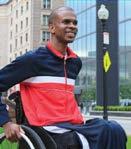
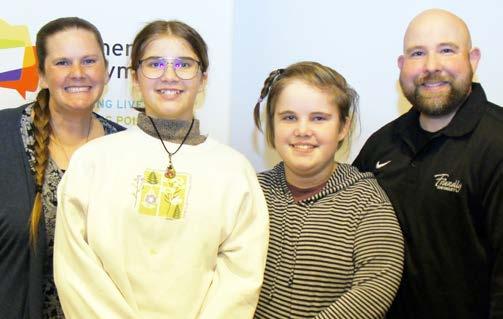
Disability advocacy and leadership training for parents of young children with developmental disabilities and adults with disabilities is provided through Minnesota’s groundbreaking Partners in Policymaking program. Some of the 2023-2024 graduates shared their experiences in the program, which was developed by the Minnesota Governor’s Council on Developmental Disabilities.
One parent was motived to talk with Anoka County Commissioners Mindy Meisner and Julie Jeppson to discuss the county’s need for adaptive recreation and inclusion services, from parks and recreation to library services. Her goal is to have services that will provide her daughter and others with expanded interactions with the community and a range of community experiences.
Another parent applied for the program, to better understand government programs and policies that apply to people with disabilities and how to make them better. The family has a teenage daughter with Down Syndrome. This family found themselves taking months to get through the waiver services process, and now is committed to helping others do the same. The class also pushed this parent to plan for the next phases in her daughter’s life in the areas of customized employment, housing, and transportation. Her goal is to give her daughter the “dignity of making choices” to guide her growth and the “dignity of risk and failure.”
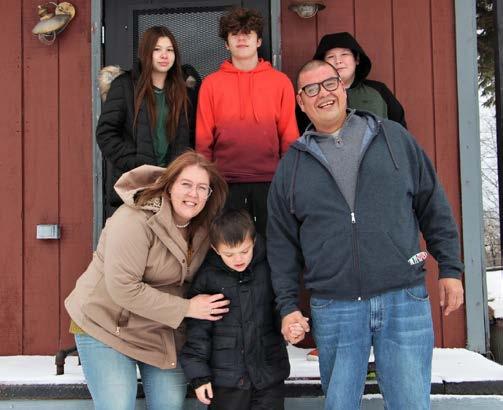
Another parent, with a daughter with autism, didn’t know where to begin when advocating for her child. She said, “Partners
in Policymaking class appeared to be the best place to learn advocacy skills. The class emphasized the inclusion of people with disabilities in home, work, school, and community life. . . This class helped me not only advocate for my son, but also helped me feel less alone. I found a community of individuals who were without judgement and will be lifelong friends.”
When another parent learned that her son had autism, she realized that she had never met anyone with autism and had no idea of what to do or what his future would be like. She applied to Partners to become a better advocate for him and assist him in having a good relationship with others. In the class she befriended several class members with disabilities, realizing that she would want the same for her son when he is an adult.

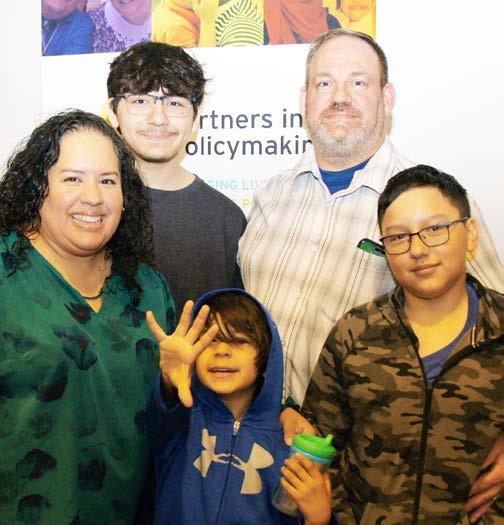
“The speakers, and the adults with disabilities in my class, helped me realize that my son could someday be employed, live on his own, be independent and learn to be an advocate for himself,” she said. She also credits the class with opening doors to “amazing friendships” with people whom she would have not met any other way.
She sees parenting a child with disabilities as a lonely challenge and requires each parent to take time to recharge. “The class causes you to miss work and family obligations, but it is worth the effort because it changes how you feel about your child,” she said. “When a parent feels ashamed that their child has disabilities, it is
September 2023 Volume 34, Number 9 Pg 6
PEOPLE & PLACES
Responsive PCA Choice Services Independent Living Services ADA Information & Referral Covid Community Coordination Transitional and Housing Services Contact us today! www mcil-mn.org 651-646-8342 530 North Robert Street Saint Paul, MN 55101 Responsive PCA Choice Services Independent Living Services ADA Information & Referral COVID Community Coordination Transitional and Housing Services Contact us today! 651-646-8342 www.mcil-mn.org Responsive PCA Choice Services Independent Living Services ADA Information & Referral Covid Community Coordination Transitional and Housing Services Contact us today! www.mcil-mn.org Live your most independent life, follow your path! Live your most independent life, follow your path! GRADUATES To page 7
Elmquist to lead Olmstead office
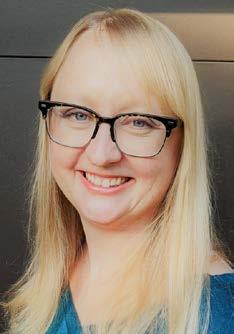
Aisha Elmquist will be the next director of the Minnesota Olmstead Implementation Office [OIO]. She has an extensive history of serving people with disabilities, most recently as the deputy Ombudsman for Long-Term Care. She has also worked as an attorney for the law firm of Fox Rothschild LLP, clerked for U.S. District Court Judge John R. Tunheim, and served as a staff attorney at Mid-Minnesota Legal Aid.
She has a long history of fighting for the civil rights of people with disabilities, including rights under Olmstead v. L.C. She is experienced with leading large-scale, collaborative efforts. Her hiring comes at the time as the state is starting to develop the next Olmstead Plan, bringing the work of ensuring that people with disabilities live, learn, work and enjoy life in the most integrated setting to a whole new level.
She is a graduate of Carleton College and the University of Michigan Law School and a recent Policy Fellow at the Humphrey School of Public Affairs.
She took on her new duties at OIO at the end of August.
Six are Rise’ing Stars
The disability service provider Rise has given six people its annual Rise’ing Star award. The six are doing big things in their communities. They have overcome obstacles, met and surpassed personal goals to achieve great success.
Taiye Agboola has always had an

impressive work ethic and a strong desire to be independent. He began working on the production floor in 2014 through a sensory program for people who are deaf, deafblind, and hard of hearing. While he had occasionally worked at community sites, late last year an opportunity arose to consistently switch from production to
∏∏f In Memoriam f∏∏
Lopez helped others enjoy books
Anthony “Tony” Lopez was dedicated to helping people with disabilities enjoy a wide variety of reading material, through his longtime role at State Services for the Blind/Radio Talking Book. Lopez died suddenly this summer. He was 55 and lived in Minneapolis.
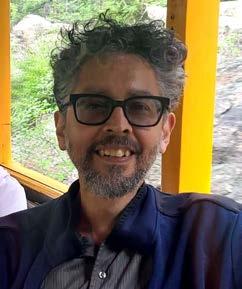
A native of Los Angeles, Lopez was a graduate of Knox College. In 1993 he began to volunteer with Radio Talking Book began in 1993. He became an employee in 1997 and was the volunteer coordinator and a broadcaster at the time of his death.
He cared deeply about the services Radio Talking Book provides and was always a strong advocate for its listeners and volunteers.
In September he will be remembered on a special broadcast on the Bookworm programs. Audio information services from across the country collaborated to record the book Bicycling with Butterflies. Each chapter is presented by a partner reading service, from Texas to Massachusetts, as the route of the butterfly migration is followed. Lopez can be heard reading on broadcasts six and seven. The schedule is on page 10 of this issue of Access Press.
Lopez is also remembered for his deep commitment to his family and friends. he enjoyed usic and cooking, and was a strong
supporter of public libraries. He is survived by his wife, Laura Wolovitch; his daughter, Minnie Wolovitch-Lopez; his mother, Lorraine; sister, Teresa; and brother, Orlando; and many nieces, nephews, aunts, uncles, and in-laws. Services have been held. Memorials are preferred to his family.
IN MEMORIAM To page 8
a community site at Ajax Metal Forming Solutions in Fridley. He worked through uncertainties with sensory staff support and now works independently at Ajax.
Agboola’s independence and diligent work attitude have allowed him great success. He continues to thrive while overcoming his naturally introverted personality to communicate more with coworkers and supervisors. He shows up early and works until the very end of his shift.
The first task Ryan Courteau took on when he became a Finley’s Dog Treats store ambassador was to “practice his smile” because he hadn’t been out in the community much. He was shy, quiet, and hesitant to engage. But his practice and persistence paid off. He is now so outgoing and social that he was promoted to Senior Finley’s Brand Ambassador. He is an outstanding leader who trains new ambassadors in a fun and supportive way.
Teddy Harrison, Jr. nurtures an artistic talent that has become a great source of pride and joy. He lives with a brain injury sustained during a car accident when he was three years He took up painting through the art therapy program shortly after coming to Rise two years ago and has embraced his talent with extreme passion.
Because he is happiest when creating new and beautiful art, Harrison paints daily. His favorite day of the week is Friday when he paints one-on-one with our Art Therapist, Stacy Gross. He entered his work at the Anoka County Fair, where judges recognized his talent, awarding him a blue and a second-place ribbon.
Jason Heinbuch is a devoted worker and problem solver. Any goal Heinbuch sets, he
GRADUATES
From page 6
not good for the child.”
She considers that Partners gives you “a degree in disabilities” and especially in the role of parenting. “Above all, I am a better parent because of this class.”
One man applied to Partners to be part of a class setting, learn new things, and to meet new people. He was interested in the history of how people with disabilities have been
achieves. He works incredibly well with his coworkers and staff; whenever he notices a problem or sees someone struggling, he’ll be the first to volunteer to help.
He works at Westfall Technik in New Richmond, Wisconsin, where he is called upon to do many different tasks. He loves these new opportunities because enjoys learning new things and problem-solving to be more efficient. He is also skilled at teaching tasks to his coworkers.
Daniel Dooley possesses all the qualities of an accomplished person. He has found meaningful work, is creating the life he wants, and continues to rely on his support while giving back to our community. Currently, Dooley is working at bowling alley and arcade Bowlero, where he takes great enjoyment from upbeat customer interactions.
Earlier this year, he testified before the Minnesota Legislature to publicly advocate for the Legislative Mental Health Network bill Daniel participates in Rise’s IPS supports program in Hennepin County.
Stacey Goede has been a mainstay through some major changes this past year. As Rise transitions production work to community worksites, she has become an expert in the processes of our Cummins Power Generation work teams as this big job moves from internal programs into the community to Cummins. The move has come with much change but Goede has remained professional and dedicated to the work. Goede has become an expert troubleshooter, and learned many new things while going above and beyond communicating the changes at Cummins.
treated. The class gave him opportunities to work in teams and to practice his public speaking skills. He valued going to the capitol and making arrangements to meet Sen. Matt Kein.
With the emphasis on networking, he became more comfortable in meeting and working with new people and now has more people he can contact if he has questions. He recommends this class because of the experience gained when working with others, meeting with elected officials, and learning about the history of disabilities.
mn.gov/dhs/renewmycoverage
September 2023 Volume 34, Number 9 Pg 7
PEOPLE & PLACES
Keep your health insurance If you have Medical Assistance or MinnesotaCare, be ready for your renewal Your opinion matters to us. 55 35W 280 94 51 35W 35E St. Paul Minneapolis Marion St. Rethinking I-94 Share your thoughts on the Rethinking I-94 alternatives by visiting: talk.dot.state.mn.us/rethinking-i94
Aisha Elmquist
Anthony "Tony" Lopez
Nexus family healing to open facility
A shuttered psychiatric residential treatment facility will reopen with a new owner. Plymouth-based Nexus Family Healing announced that the nonprofit will open its first psychiatric residential treatment facility in East Bethel. Nexus acquired the property for $15.5 million and will reopen it in 2024.
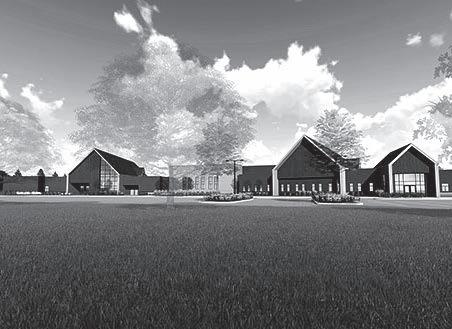
The Hills Youth and Family Services of Duluth opened Cambria Hills facility in 2020 at a cost of $28 million, after community debate over where it should be located. The facility closed a year later. The Hills, which had been in operation for 112 years, closed in 2022.
Nexus Family Healing is a nonprofit mental and behavioral health organization. It serves people in Minnesota, North Dakota, Illinois and Maryland. It provides outpatient/ community mental health services, foster care/adoption, and residential treatment to children, families and adults.
Nexus plans to serve up to 40 clients, male and female, aged 10-19 with mental health and behavioral needs at the East Bethel facility. Up to 90 staff will be employed there.
“Minnesota urgently needs more options for young people with behavioral health needs,” said Eric Grumdahl, assistant commissioner for Behavioral Health, Housing, and Deaf & Hard of Hearing Services for the Minnesota Department of Human Services, in the Nexus announcement. “We are grateful for Nexus Family Healing’s work to create this PRTF and will continue to partner with them and all providers who are standing up new programs and capacity to meet these critical needs.”
The Hills closed Cambia Hills, and finally closed all its operations, blaming extraordinarily high fixed costs, the state’s inaction on rate adjustments and the staffing shortages and other fallout from the COVID pandemic.
Renewals effort results mixed
As part of the nationwide effort to encourage people to renew their Medicaid eligibility, nearly 50,000 Minnesotans took action to keep their Medical Assistance or MinnesotaCare health insurance, the Minnesota Department of Human Services announced.
“Minnesota is taking a careful approach to ensure that eligible people keep their insurance,” said Human Services Commissioner Jodi Harpstead. “DHS and our community partners are doing everything from text reminders, to letters, phone calls, posters, events and extended deadlines as we urge people to return their paperwork. We add new approaches every month and will keep making adjustments to reach as many people as we can.”
States across the country were required to restart checking people’s eligibility for Medicaid programs earlier this year after a nearly three-year national pause during the COVID pandemic, which kept people insured when coverage was needed most.
National estimates show that about 5.8 million people in other states have had their Medicaid coverage renewed, while approximately 3.7 million people have already lost coverage.
The call to action for individuals to check their mail and return the forms on time to retain coverage for MinnesotaCare or Medical Assistance insurance started this May for the 97,900 individuals who have an annual renewal date in July. The Department of Human Services, counties, tribes, health plans, health care providers, Tribal health partners and other stakeholders deployed multiple strategies to remind individuals to renew their health care from sending direct mail and text messages, to phone calls and some in-person
IN MEMORIAM
From page 7
Thompson’s research helped many
Travis Thompon’s academic and research career helped many people with disabilities. Thompson died in August. He was 86 and lived in Roseville.
Thompson’s long career is summarized in his biography on the Association for Behavioral Analysis International. He received his doctoral training in psychology at the University of Minnesota and completed postdoctoral work at the University of Maryland and at Cambridge University. His earliest work dealt with the relations among concepts from behavior analysis, ethology, and pharmacology. He was director of the John F. Kennedy Center for Human Development at Vanderbilt University and Smith Professor of Psychiatry at the University of Kansas Medical Center before returning to Minnesota in 2003.
Thompson co-authored the first textbook in behavioral pharmacology and did basic and applied interdisciplinary research in developmental disabilities, including genetics, pharmacology, and neuroscience. He was involved in developing one of the
(Source: Finance and Commerce)
contacts. To ensure as many individuals kept their coverage as possible, outreach efforts increased over the summer, coupled with the Department of Human Services extending the renewal deadlines by 30 days for the first two groups.
Coverage was extended until the fall for 10,000 enrollees who get their Medical Assistance coverage based on having a disability, being blind or being aged 65 or older as part of the state’s mitigation plan with the Centers for Medicare & Medicaid Services.
Medical Assistance coverage ended for about 5,600 people who submitted renewal forms and were found ineligible, or referred to MNsure, the state’s health insurance marketplace.
Coverage also stopped for about 32,600 people whose status is unknown. Some likely didn’t submit forms because they already had insurance from an employer or knew they were no longer qualified for MinnesotaCare or Medical Assistance. Others may not have an updated mailing address on file or did not realize that the documents were important.
People who missed their renewal deadline should still turn in their forms because they may be able to reenroll or even qualify for retroactive coverage. Enrollment for Medical Assistance and MinnesotaCare is always open, and people can apply at any time.
“Continued coverage is critical for access to vital medical and social services for Minnesotans across the state,” said Matt Freeman of the Minnesota Association of County Social Services Administrators, the statewide organization for county human services directors. “Minnesota counties are diligently processing applications and doing outreach to Minnesotans, in partnership with community organizations, providers,
first large-scale behavioral intervention programs for individuals with intellectual disabilities, and for several years directed home-based early intervention services for young children with autism in Minnesota. His research and practice had a profound effect on improving the lives of people with developmental disabilities.
Thompson also loved art and was an accomplished stained glass and water color artist. He is survived by his wife, Anneke; children and grandchildren.
Memorials preferred to the Autism Society of Minnesota or Minnesota Public Radio. A celebration of his life will be held A celebration of Travis life will be held on 2 p.m. Saturday, September 23 at the First Unitarian Society of Minneapolis 900 Mt Curve.
Kenney gave spiritual gifts
Rev. William "Bill" Kenney considered himself to be a servant of God, who focused much of his life to serving people with disabilities through the Catholic Church. Kenney died this summer. He was 93 and lived in St. Paul.
He attended Cretin High School, Nazareth Hall, and later pursued his higher education at St. Paul Seminary where he received Master of Divinity and an MA in history degrees. In 1956, he was ordained
and the state, to determine individuals’ and families’ continued eligibility in a timely manner.”


People can look up the deadline for their paperwork at mn.gov/dhs/renewmycoverage.
Free help filling out the forms is available through MNsure navigators in trusted community organizations.
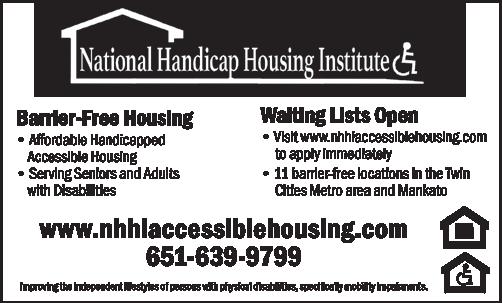
One in four Minnesotans have either MinnesotaCare or Medical Assistance, Minnesota’s Medicaid program. Between July 2023 and May 2024, state, county and Tribal workers will check eligibility requirements for 1.5 million Minnesotans in monthly batches.
For more information about Medical Assistance and MinnesotaCare renewals, including how to connect with a navigator, visit mn.gov/dhs/renewmycoverage.
(Source: Minnesota DHS)
Federal lawsuit allege discrimination
Two Richfield mothers filed a federal civil rights lawsuit against Richfield Public Schools, alleging that the district imposed discriminatory disciplinary practices against their children after gunshots were fired at a homecoming game last year.
Although the three Richfield High School students were not involved in the shooting, court documents stated, administrators suspended them, subjected them to daily searches, banned them from extracurricular activities, and required them to have an escort in order to move throughout the school.
The lawsuit was filed by Leah Harris and her twin sons, who are African American and Asian American, and Tara Behl and her son, who has a disability. The district and several administrators in Richfield Public Schools are named as defendants in
a priest. Throughout his career, Kenney served in several parishes and held various roles. His compassionate nature led him to serve as a chaplain at St. Mary's Hospital in Minneapolis, Faribault State Hospital, Minnesota Braille and Sight Saving School, and Minnesota School for the Deaf in Faribault. In his later years, he dedicated himself to serving as the chaplain for the
the case.
The boys found various restrictions humiliating and confusing, said attorney Margaret O'Sullivan Kane, who is representing both families in the lawsuit. Richfield Public Schools declined to comment, citing the open litigation.
According to the lawsuit: All three students were attending the Richfield High School homecoming football game on September 23, 2022 when a shooting took place nearby. Two people were injured. None of the students in the lawsuit were involved in the shooting, but Richfield Public Schools suspended each of them for three days.
Richfield High School administrators also confiscated the students' phones daily, and prohibited them from participating in extracurricular activities, including athletics and prom, according to the lawsuit. Outside of passing time, lunch, and recess, the three teenagers could only go to the bathroom if they had an adult escorting them.
The lawsuit also alleges that Richfield High School administrators attempted to require the students' parents to enroll their children at Richfield's alternative high school for at-risk youth, South Education Center Academy (SECA).
“Richfield has a pattern and practice of disproportionately removing minority and disabled students to SECA for minor behavior infractions whereas Caucasian and non-disabled students are not referred to SECA for similar infractions,” the lawsuit stated.
(Source: Sahan Journal)
deaf and people with hearting disabilities in the metro area. He was most proud of this ministry which he did for 50 years. Kenney is survived by many nieces, nephews and friends. Services have been held. Memorials’ preferred to the Carmen Pampa Fund or the Good Shepherd Sisters.
September 2023 Volume 34, Number 9 Pg 8
REGIONAL NEWS
RADIO TALKING BOOK
Learn about Radio Talking Book
Have a smartphone? Radio Talking Book’s app allows listeners to take “reading material” on their summer adventures.
Radio Talking Book is not just for listeners with visual disabilities. Anyone with difficulty reading or turning pages can enjoy the service.
Enjoy programming on a hand-held mobile device, for either iOS or Android. Visit the Apple App Store for iOS, or Google Play for Android, and download the Minnesota Radio Talking Book app.

Listen to RTB’s live or archived programs online at www.mnssb.org/rtb
Books broadcast on the Minnesota Radio Talking Book Network are available for loan through the Minnesota Braille and Talking Book Library in Faribault. The catalog is at www.mnbtbl.org, click on the link Search the Library Catalog. Call the Minnesota Braille and Talking Book Library at 800-722-0550, Mon-Fri, 9 am - 4 pm CST.
For updates, go to the Facebook site Minnesota Radio Talking Book.
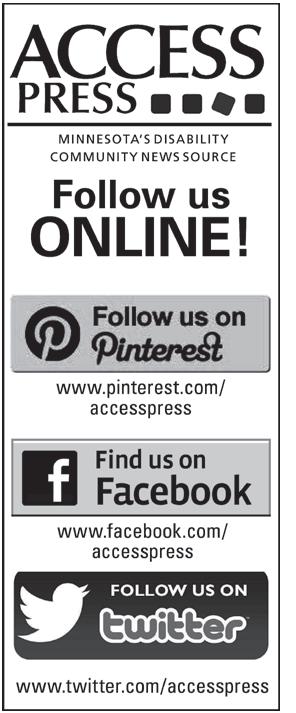
Audio information about the daily book listings is on the National Federation for the Blind (NFB) Newsline. Register for NFB Newsline by calling 651-539-1424. The NFB-NEWSLINE service provides access to more than 500 magazines and newspapers. To learn more, visit www.nfb. org/programs-services/nfb-newsline
Donate to the State Services for the Blind at mn.gov/deed/ssbdonate
The sampling published monthly in Access Press doesn’t represent the full array of programming.
Chautauqua*
Monday – Friday 6 a.m.
Sacred Nature, nonfiction by Karen Armstrong, 2022. A profound exploration of the spiritual power of nature—and an urgent call to reclaim that power in everyday life. Read by John Holden. Six broadcasts; begins Mon, Sept. 4.
A Hacker’s Mind, nonfiction by Bruce Schneier, 2023. A legendary cybersecurity expert reveals how using a hacker’s mindset can change how you think about your life and the world. Read by John
Potts . Nine broadcasts; begins Tue Sept. 12.
Disability Pride, nonfiction by Ben Mattlin, 2022. An eye-opening portrait of the diverse disability community as it is today, and how disability attitudes, activism, and representation have evolved since the passage of the Americans with Disabilities Act. Read by Jack Rossmann. 11 broadcasts; begins Tue, Sept. 25.
Past is Prologue*
Monday – Friday 11 a.m.
Firepower, nonfiction by Paul Lockhart, 2021. A study of how military technology has transformed the world. Read by Charles Gould. 24 broadcasts; begins Mon, Sept. 4.
Bookworm*
Monday – Friday 12 p.m.
Bicycling With Butterflies, fiction by Sara Dykman, 2021. Science, nature, and adventure come together in this riveting account of a solo bike trip along the migratory path of the monarch butterfly. Read by various readers, including the late Tony Lopez. 12 broadcasts; begins Mon, Sept. 4.
Terra Nova, fiction by Henriette Lazaridis, 2022. A haunting story of love, art, and betrayal, set against the heart-pounding backdrop of a 1910 Antarctic exploration. Read by Jim Tarbox. 11 broadcasts; begins Wed, Sept. 20.
The Writer’s Voice*
Monday – Friday 1 p.m.
The Hard Parts, nonfiction by Oksana Masters, 2023. In this story of triumph over adversity, the United States’ most decorated winter Paralympic athlete, tells her story of overcoming extraordinary physical challenges to create a life that, by example, challenges everyone to push through what is holding them back. Read by Carol McPherson. 13 broadcasts; begins Mon, Sept. 4.
Putin, nonfiction by Philip Short, 2022. The first comprehensive, fully up-to-date biography of Vladimir Putin, woven into the tumultuous saga of Russia over the last sixty years. Read by Ginny Kraus. 37 broadcasts; begins Thu, Sept. 21.
Choice Reading
Monday – Friday 2 p.m.
The Measure, fiction by Nikki Erlick, 2022. If you had the choice, would you want to know how long you had to live? —An invigorating story about destiny that encourages us to live life to the fullest.
Read by Eileen Barratt. 12 broadcasts; begins Mon, Sept. 4. – L Moth, fiction by Melody Razak, 2022. A saga of one Indian family’s trials through the tumultuous 1947 split of Pakistan from India, exploring its impact on women, what it means to be “othered” in one’s own society, and the redemptive power of family. Read by Carol McPherson. 13 broadcasts; begins Wed, Sept. 20.
Afternoon Report*
Monday – Friday 4 p.m.
Nation of Victims, nonfiction by Vivek Ramaswamy, 2022. A 2024 presidential candidate makes the case that the essence of true American identity is to pursue excellence unapologetically and reject victimhood culture. Read by Yelva Lynfield. 12 broadcasts; begins Mon, Sept. 18.
Night Journey*
Monday – Friday 7 p.m.
The Lost Kings, fiction by Tyrell Johnson, 2022. A stellar psychological thriller, bristling with surprises and packed with secrets, and an affecting exploration of love and the familial ties that bind us. Read by Cintra Godfrey. 11 broadcasts; begins Mon, Sept. 11. – L, S
The Winter Guest, fiction by W. C. Ryan, 2022. A haunting, atmospheric mystery set against a divided Ireland in 1921. Read by Rick Seime. 10 broadcasts; begins Tue, Sept. 26.
Off the Shelf*
Monday – Friday 8 p.m.
The Complicities, fiction by Stacey D’Erasmo, 2022. A haunting and emotionally fraught story of a woman dealing with the ripple effects of her husband’s financial fraud—and with what she knew, or pretended not to know, about it. Read by Pat Muir. 10 broadcasts; begins Wed, Sept. 6. – L
Thanks to ALL OF YOU for supporting Access Press
BENEFACTOR ($1000 & up)
Janice Chevrette
Ronna Linroth
Brandon Miller
Lynda Milne
Ann and Larry Roscoe
Joel Ulland
Kay Willshire
Tamarack Habilitation Tech, Inc.
GOLD ($500-$999)
Jeff Bangsberg & Anita Boucher
Anne L. Henry
Kim Kang
Steve Kuntz
Holly Anderson
Jim Musselman
Debra J. Shriver
Robyn Wade
Courage Kenny
Just Comfort
SILVER ($150-$499)
Anne L. Henry
BRONZE ($75-$149)
Sarah Berg
Jesse Bethke-Gomez
Tom Clark
Richard Cloud
Margot Cross
Daniel Ness
Dawn R. Doering
Dean Doering
Craig J. Dunn
Anonymous
Ellen J. Emanuel
Steve & JoAnn Erbes
Dale Erickson
Claudia Fuglie
Lael Gatewood
Marjorie Goldberg
Mike Gude
Terry Hagenah
Hammer Residences
Ellen & Skip Houghton
Maren Hulden
Catherine Hunter
Dale Janiszeski
Kim Keprios
Alexandra Bartolic
Dena Belisle
Tim S. Benjamin
Gretchen Bratvold
John & Marilyn Clark
Mark Daly
Yoshiko S. Dart
Anonymous
Rosebud Elijah
Lee Ann & Dale Erickson
Kent Fordyce
Vicki Garrets
Robert Gregory
Craig Dunn & Candy Hart
Pam Hochrein
Judy Hunt
Rick & Susie MacPherson
Brian Musselman
Manley Olson
Mark W. Traynor & Jen Peterson
Julee Quarve-Peterson
Hilary and Stuart Ratner
Ken Rodgers
Ann M. Roscoe
Walt Seibert
Amanda & Mark Tempel Hammer Residences, Inc.
All times listed are Central Standard Time.
Abbreviations V – violent content R –racial epithets L – strong language S –sexual situation G – gory descriptions
Big Red, fiction by Jerome Charyn, 2022. A reimagining of the tragic career of Rita Hayworth and her indomitable husband, Orson Welles, narrated by a starryeyed lesbian. Read by Greg Olson. Nine broadcasts; begins Wed, Sept. 20. – L Potpourri*
Monday – Friday 9 p.m.
Blood & Ink, nonfiction by Joe Pompeo, 2022. An investigation of the notorious 1922 double murder of a high-society minister and his secret mistress, a Jazz Age mega-crime that propelled tabloid news in the 20th century. Read by Jim Ahrens. Nine broadcasts; begins Mon, Sept. 4.
City of Hustle: A Sioux Falls Anthology, nonfiction edited by Jon K. Lauck & Patrick Hicks, 2022. Essays offering a unique take on the South Dakota town residents call “the Best Little City in America.” Read by Phil Rosenbaum. 14 broadcasts; begins Mon, Sept. 18. – L, S
Good Night Owl*
Monday – Friday 10 p.m.
The Lost Dragon Murder (rebroadcast), fiction by Michael Allan Mallory, 2021. Detective Henry Lau's investigative ability and kung fu skills are pushed to the limit when the murder of an art expert propels him into the nebulous world of ancient antiquities. Read by Tom Speich. Nine broadcasts; begins Tue, Sept. 5. – L
The Quarry Girls, fiction by Jess Lourey, 2022. A nerve-twisting, 1977 Minnesotaset thriller inspired by a shocking true crime. Read by Holly Sylvester. 10 broadcasts; begins Mon, Sept. 18. – L, S, V
RTB After Hours*
Monday – Friday 11 p.m.
The Belle of Belgrave Square, fiction by Mimi Matthews, 2022. A London heiress rides out to the wilds of the English countryside to honor a marriage of convenience with a mysterious and
To page 11
SUPPORT ACCESS PRESS*
Friend $50+ Bronze $75+
Silver $150+ Gold $500+
Benefactor $1000
DATE:
Megan Keyser
Steve Larson
Jane Larson
Michelle & John LeBlanc
Gene Martinez
John Marty
Tom & Ky Milne
Eric S. Nelson
Daniel Ness
Annette M. Pantel
Mark Payette
Reach for Resources
Carrie Salberg
Anita & Luther
Schermer/Granquist
Stephanie Schwartz
Jon Skaalen
Laurene Tomaszewski
Cathy Wick
Zekerya Yargici
Leslie Zaricor
Richard Ziton
FRIEND ($50-$74)
Andrea McKee
Nora Aileen Beall
Joanna & Richard Cortright
Paul Bauer & Pat Cretilli
Nancy N. Eustis
Thomas Fogarty
Give Lively Foundation
Burl Gilyard
Ann Griffith
Phil Jacobsma
Laura Johnson
Barb Kane
Mark Knutson
Tag Krogseng
Sandy Lane
Kenneth Latkin
Twyla M. Misselhorn
William & Joan Overby
Annette M. Pantel
Sonja Peterson
Donn Poll
Alina Schroeder
Mike Schwartzbauer
Gwendolyn Short
Diane Sprague
Katherie Tomlinson
Dick VanWagner
Katheryn J. Ware
Linda Wolford
AMT. ENCLOSED $
NAME
ADDRESS CITY/STATE/ZIP
PHONE
EMAIL
September 2023 Volume 34, Number 9 Pg 10
651-644-2133 access@accesspress.org
your sponsorship to: Access Press, LTD. PO Box 40006, Industrial Station, St. Paul, MN 55104-5485
Mail
RADIO TALKING BOOK
Made in the Shade
Post your event online
Access Press is moving more event listings online. That is possible with our redesigned website. There is a word limit and we ask that those posting information include event costs as well as accommodations. Are ASL and AD offered? Is there companion seating? A quiet room? Fidgets? COVID-19 protocols?

Accommodations are much more than a ramp for many of us. That kind of information can help someone decide whether or not to attend an event.
To post an event, go to www.accesspress. org, click the resources tab at top right, and go to the post an event line.
Consider that a small web or print ad can also generate interest in an upcoming event. For questions about ads, email ads@ accesspress.org
Access Press reserves the right to reject events if they do not meet our guidelines. Call the editor at 651-644-2133 ext. one or email jane@accesspress.org with events questions.
NAMIWalks steps up
11 a.m. Sat, Sept. 23 at Minnehaha Park, Mpls. Enjoy food trucks, music and more. The walk itself starts at 1 p.m. In 2022, NAMIWalks Minnesota was one of the top three walks in the United States, bringing in 539,186.55! The 2023 goal is starting at $500,000. Walk as a team or individual. Register now. FFI: https://www.namiwalks. org/index.cfm?fuseaction=donorDrive. event&eventID=1393
Do the Woofaroo
The Can Do Woofaroo is 10 a.m.-2 p.m. Sat,
Take a Survey
Sept. 23. Walk begins at 11 a.m. The outdoor, family fun event includes a fundraising walk and many activities. people and wellbehaved dogs are welcome. registration for the fundraising walk is underway. Register as a team or individual. FFI: https:// candowoofaroo2023.causevox.com/
Open Flow Forum
The Artists with Disabilities Alliance meets via Zoom 7-9 p.m. the first Thu of the month. Upcoming dates are Sept. 7 and Oct. 5. Virtually join artists with disabilities and supporters to share visual art, writing, music, theater and artistic efforts or disability issues.
Facilitators are Tara Innmon and Andy Sturdevant from Springboard for the Arts. Anyone needing accommodations including ASL interpreting or captioning should contact Sturdevant at Springboard. Funding is available for access needs. FFI: 651-2940907, resources@springboardforthearts.org, openflowmn@gmail.com.
Resources to Enjoy!
The Enjoy! listings are for arts events as well as banquets, fundraisers, walks and other fun events by and for disability services organizations. Schedules may be subject to change, so check with a venue or organization before making plans. Arrange for disability accommodations well in advance at any event.
Disability service organizations typically send e-news blasts and have social media. Both are other ways to find out about events.
The Minnesota Access Alliance (MNAA) provides an Accessible Arts &
OPPORTUNITIES
friendly experience. Cost $35. Scholarships are available. FFI: www.ausm.org
Dealing with workforce shortage?
The Olmstead Implementation Office is seeking feedback about experiences with employment! The Olmstead Workforce Shortage and People with Disabilities Work Group is made up of community members, advocates, and state staff. During the past two years, group members have been gathering information to make recommendations for improving the Olmstead Plan. To help fill in the gaps in information, the work group is asking for specific feedback from people with disabilities. The survey data will be presented to the Olmstead Leadership Forum and used to improve the next version of the Olmstead Plan. Complete the survey by end of day Thu, Sept. 14, at https://www. surveymonkey.com/r/workforce-public-2023
Conference
AuSM Conference draws near
The Autism Society of Minnesota (AuSM) has opened registration for its Sixth Annual Autistic Community Summit. The day-long event is Sat, Oct. 14 at Lionsgate Academy in Shoreview. Features include integrated social opportunities throughout the day, including a social room to can take a break to meet other autistics at any time during the day, and lunchtime meet up groups to visit with with others who have similar identities and interests. Both half-hour and full-hour presentations are incorporated throughout the day to give more people the opportunity to present. the summit will be a hybrid format, offers in-person and virtual. All speakers are neurodivergent, although we have invited some neurotypicals to support as moderators of panels. The summit is planned as a sensory and accessibility-
Children and families
PACER workshops sampling PACER Center offers many useful free or low-cost workshops and other resources for families of children with any disabilities. Some in-person workshops are offered at PACER Center and also offered online. Other workshops are wholly online and livestreamed at this time. Advance registration is required for all workshops. At least 48 hours’ notice is needed for interpretation. Check out PACER’s website and link to the newsletter of statewide workshops that allows participants to pick and choose sessions designed for their needs. Access Press only provides a sampling of the workshops offered.
Assistive Technology for Healthy Habits is 6:30-7:45 p.m. Thu, Sept. 14. Families know that all children need good health to function well in school and at home, but how can parents help their children develop and stick to healthy habits? In this workshop, parents will see demonstrations of several fun and engaging apps, along with other tools that can help support wellness. Topics covered include exercise, nutrition, sleep, social emotional learning, and screen time. Online.
STEAM Rollers: Fall Series Part 1 is 10:30 a.m.-12:30 p.m. Sat, Sept. 16. STEAM Rollers is a science, technology, engineering, arts, and math (STEAM) tabletop role-playing group (like Dungeons & Dragons) for middle to high school students. Up to six participants will immerse in a challenge while taking on the persona of a STEAM professional to solve a related problem. Youth won’t want to miss this fun and immersive experience! At PACER Center.
The annual Made in the Shade 5K Walk, Run & Roll is 9:30 a.m. – 12:30 p.m. Saturday, Sept. 16 near Thomas Beach, at Bde Maka 5K (formerly lake Calhoun) in Mpls. The event benefits several disability service organizations. It is a celebration of partnerships, friendships, fundraising and community-building that makes a difference for hundreds of people with disabilities. Participating organizations are currently collecting pledges. FFI: https://www.facebook.com/madeintheshade5k

Culture Calendar for arts patrons who use accessibility accommodations such as audio description, captioning, ASL interpreting and sensory-friendly accommodations. Link to more details at https://calendar.mnaccess. org. Be sure to check the listing or venue to find out any COVID-19 protocols and if an advance reservation is needed for an accessibility service. Accessible events can be submitted to the
STEAM Rollers: Fall Series Part 2 at 10:30 a.m.-12:30 p.m. Sat, Sept. 23. STEAM Rollers is a science, technology, engineering, arts, and math (STEAM) tabletop role-playing group (like Dungeons & Dragons) for middle to high school students. Up to 6 participants will immerse in a challenge while taking on the persona of a STEAM professional to solve a related problem. At PACER Center.
Tech for Teens Club : PACER Makerspace
Experience is 1-2 p.m. Sat, Sept. 23. Join Tech for Teens staff on a tour of the new PACER Makerspace. Get a first look at the cutting-edge tools and equipment and help staff plan for 2024. provide feedback and ideas to staff. At PACER Center. FFI: PACER, 952-838-9000, 800-537-2237, www.pacer.org
Info & Assistance
Many classes available NAMI Minnesota (National Alliance on Mental Illness) has set up a wide variety of free and in-person online mental
RADIO TALKING BOOK
From page 10
reclusive stranger. Read by Brenda Powell. 16 broadcasts; begins Wed, Sept. 6.
Weekend Program Books
Your Personal World, 1 p.m. Sat, presents a rebroadcast of Good Anxiety by Wendy Suzuki, read by Beverly Burchett.
For the Younger Set, 11 a.m. Sun, presents Firekeeper’s Daughter by Angeline Boulley, read by Jan Anderson –
MNAA Calendar (and MinnesotaPlaylist.com)
To receive a free monthly events calendar, email mactfactor@icloud.com and/or info@ mnaccess.org. Ask for the entire events list or specific lists for ASL interpreting, captioning, audio description, sensory-friendly accommodations or disability-related topics. For other accessibility resources or upcoming webinars presented by MNAA, sign up for emails at https://mnaccess.org
health classes. Choices include Hope for Recovery, Transitions, Ending the Silence, Understanding Early Episode Psychosis for Families, In Our Own Voice, Family to Family, Positive Psychology, Creating Caring Communities, smoking cessation, a suicide prevention class called QPR – Question, Persuade and Refer, a special QPR class for Agricultural Communities and many more.
NAMI Minnesota’s Online Support Groups moved to a new and improved platform, HeyPeers. HeyPeers provides a safe, easy to access environment exclusively designed for online support group meetings. The classes and online support groups are designed for family members and caregivers, persons living with a mental illness, service providers, and also the general public. Find a complete listing of these classes and how to join in by going to namimn.org and click clicking on “Classes” or go straight to https:// namimn.org/education-public-awareness/ classes/scheduled/
L; followed by Windswept by Margi Preus, read by Laura Young.
Poetic Reflections, noon Sun, presents Prognosis by Jim Moore, read by Mary Knatterud; followed by The Sky Watched by Linda LeGarde Grover, read by Mary Knatterud.
The Great North, 4 p.m. Sun. presents When Minnehaha Flowed with Whiskey by Karen E. Cooper, read by Yelva Lynfield; followed by Dayton's: A Twin Cities Institution by Kristal Leebrick, read by John Potts.
METES & BOUNDS MANAGEMENT Company manages the following Section 8 & Section 42 (Tax Credit) properties in Minnesota. Income and rent restrictions apply.
Boardwalk Wayzata 952-473-0502
Section 8
Dewey Place/The Pines Foley 320-968-7791
Greenwood Wadena 218-631-2575 Highwood Homes Prior Lake 952-447-6961



Linderhof Park New Ulm 507-354-5964 Mission Oaks Plymouth 763-559-5770
Rustic Creek Two Harbors 218-595-1018 Todd 27 Long Prairie 320-732-6154
Town Square East Grand Forks 218-773-3631 Victory Duluth 218-722-2629
Section 42 (Tax Credit) Abbott Apartments Mpls 612-338-5588 Crosby Country Crosby 218-546-8400
Eastwood Village Oakdale 651-773-1949 Nature's Edge St. Cloud 320-203-7726
Parkside Rochester 507-281-9003 Valley High Rochester 507-536-4797
Valley View Byron 507-775-2821
Metes & Bounds is an equal housing opportunity housing company
651-224-1234
September 2023 Volume 34, Number 9 Pg 11
ENJOY !
Be part of our Access Press Directory Next edition: OCTOBER 2023 Call 651-644-2133 to be included!
FIND YOUR NEW HOME WITH AT HOME APARTMENTS Call
or visit AtHomeApartments.com for an apartment or town home Equal Opportunity Housing Classified rates: $20 (first 12 words); $1/word beyond 12. Email classified to access@accesspress.org
20th of each month. We will email total cost of classified ad.
RENT
Deadline:
CLASSIFIEDS FOR









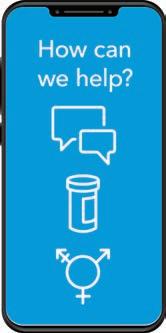
September 2023 Volume 34, Number 9 Pg 12 www.accessiblespace.org Accessible, Affordable Housing Accessible Space, Inc. Call 800-466-7722 TTY/TDD 800-627-3529 • For adults with qualifying disabilities. • Over 50 barrier-free apartment communities & homes throughout the Metropolitan Area, Greater Minnesota and the Midwest. • Locations also available in many other states. Income limits apply. • Immediate openings in Hibbing, Willmar and Hibbing, Minnesota Affordable Senior Apartments • For qualifying senior households age 62 or better. • Metro & Greater MN locations available. Income limits apply. • Accessible apartments, available for seniors in these locations. • Immediate openings in Worthington and Albert Lea, Minnesota Housing with Care* • 24-hour Assisted Living Services • Independent Living Services • Resident Community Setting (Adult Foster Care) • Eligibility for or selection of ASI services is not required to qualify for housing. ASI services are not available in all locations Services openings. Call Today! Reach our valued readers! Contact Mary Graba 651-644-2133 ext. 2 mary@accesspress.org EXPERT SEXUAL HEALTH CARE. IT’S WHAT WE DO. • Birth Control • STI Testing and Treatment • HIV Testing • Cancer Screenings • PEP/PrEP • Transgender Hormone Therapy • UTI Screening and Treatment • Annual Exams • HPV Vaccines • And More! Services Include: Care, no matter what. Whether in person or online, with or without insurance, we offer the care you need. Low- to no-cost options available. PPNCS.ORG | 1.800.230.PLAN (7526) Wingspan Life Resources offers Rainbow Support Group for LGBTQ adults with Developmental Disabilities. We provide education, resources, peer support & monthly activities. Now seeking guest speakers and volunteers. Membership is free. Contact Deb Hofbauer, Program Director dhofbauer@wingspanlife.org 651-353-7747 wingspanlife.org We hope to see you at Columbia Pride and Bloomington Pride in September!








































